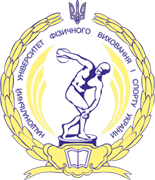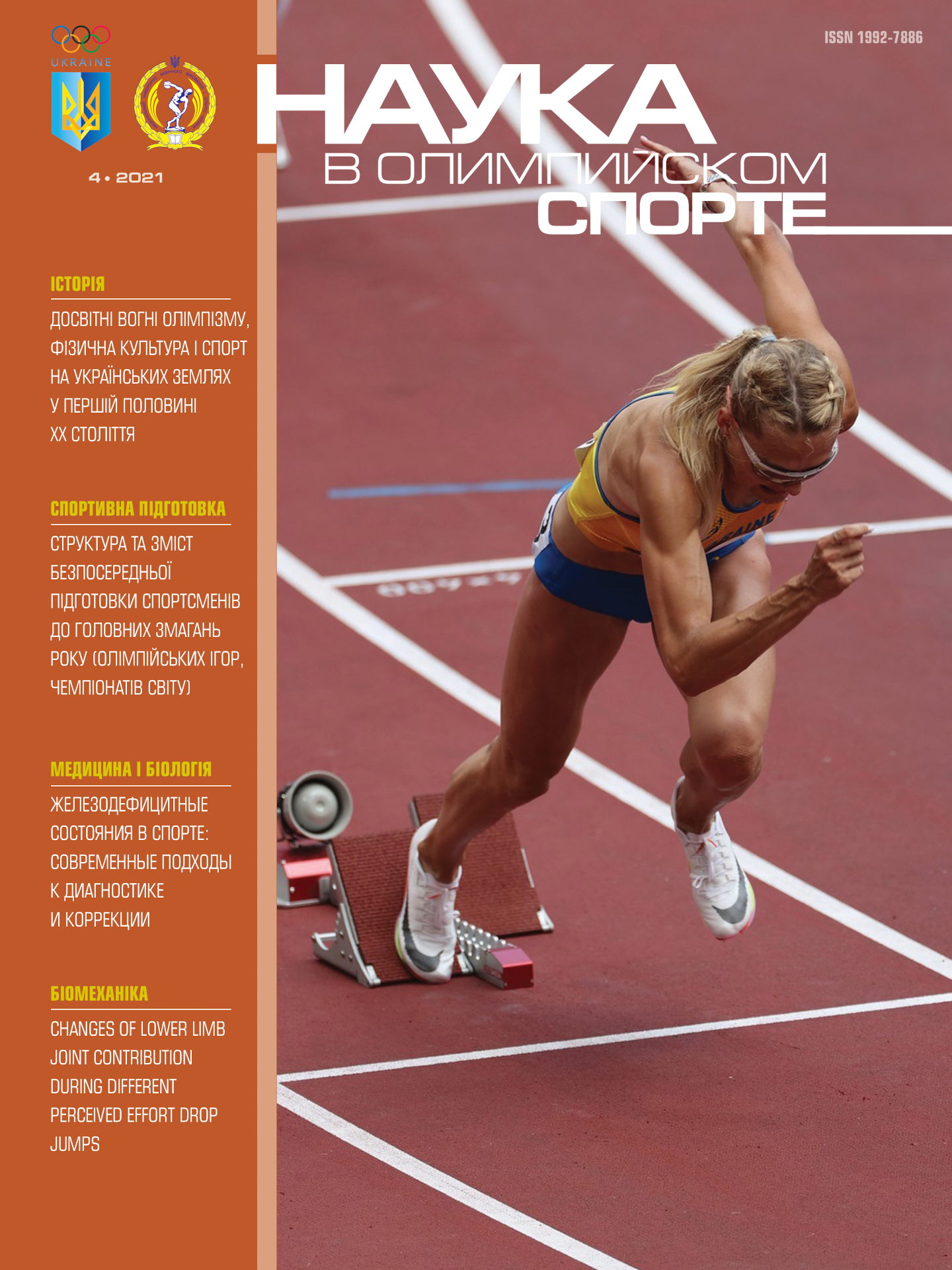Vysochyna N, Romoldanova I. Organization of control of psychological preparedness in qualified taekwondo fighters in four-year Olympic cycles. Science in Olympic Sport. 2021;3:26-36. DOI:10.32652/olympic2021.3_4
Objective. To create a universal algorithm for organizing the process of psychological control of the preparedness of qualified taekwondo fighters within the system of preparation for the Olympic Games and to determine its structure, content, key principles, and directions.
Methods. Analysis and generalization of data from scientific and methodical literature and the Internet, structural and functional method, pedagogical observation, expert evaluation, and methods of mathematical statistics.
Results. The material on control of psychological preparedness of qualified taekwondo fighters was systematized and interpreted. On this basis, the essence of psychological control and its types in the system of psychological support of qualified taekwondo fighters’ preparation in four-year Olympic training cycles were identified and the algorithm of its implementation was developed.
Conclusions. The universal algorithm for organizing the process of psychological control was developed; the structure, content, key principles, and directions of this activity within the system of athletes’ preparation for the Olympic Games were identified. A set of informative psychological components recommended by experts to diagnose the individual structure and status of psychological preparedness in qualified taekwondo athletes over four-year Olympic cycles was developed. It was found that the priority of significant psychological properties and capabilities that affect competitive performance may change depending on the athlete’s experience. It was proved that an important task of psychological preparedness control is to create individual psychological profiles of taekwondo fighters, which can be used as a model reference point in the earlier stages of long-term training. The directions of using psychological control data in the process of training qualified taekwondo fighters in four-year Olympic cycles were identified.
References
1. Arcania RA. Improving the training process of taekwondo athletes. The trajectory of science. 2016; 2 (7): 5.14-5.33.
2. Vinogradov V, Vysochina N, Rybachok R. Correction of the psychoemotional state of qualified boxers by means of bodily-kinesthetic mobilization influences [Correction of the psychoemotional state of qualified boxers by means of bodily-kinesthetic mobilization influences]. Scientific journal of the National Pedagogical University named after MP Drahomanov. Series 15: Scientific and pedagogical problems of physical culture (physical culture and sports). 2015; 10: 39-42.
3. Vysochina N, Sushko R. Selection in sports games taking into account the psychological characteristics of athletes [Selection in sports games with account for athletes ’psychological characteristics]. Science in Olympic sports. 2021; 1: 37-43. doi: 10.32652 / olympic2021.1_3.
4. NL height. Psychological support for athletes ’preparation in Olympic sports: monograph. Moscow: Sports; 2021. 304 pp.
5. Mountain GB. Psychological support for long-term athletes preparation: textbook. allowance. Krasnodar: KGUFKST; 2008. 209 pp.
6. Drukov VD. Training of elite athletes in four-year Olympic cycles. Kyiv: Scientific World; 2002. 240 pp.
7. Ilyin EP. Psychology of sports. St. Petersburg: Peter; 2012. 352 pp.
8. Korobeynikov GV, Turlykhanov DB, Korobeynikov LH, Nikonorov DM, Vorontsov AV. Control of the psychophysiological state of highly qualified wrestlers. Theory and methods of physical culture. 2021; 65 (3): 35-41. doi.org/10.48114/2306-5540_2021_3_35
9. Matveev LP. General theory of sports and its applied aspects [general theory of sports and its applied aspects]: textbook. Moscow: Soviet sport; 2010. 340 pp.
10. Medico-biological terms in sports (dictionary-reference book) [Medical and biological terms in sports (dictionary-reference book)] / Ed. LM Gunina, AV Dmitrieva. Moscow: Sports; 2019. 336 pp.
11. Mitova O., Ivchenko O. Scientific substantiation of the algorithm of complex control of basketball players at the stage of preliminary basic training [Scientific substantiation of the algorithm of complex control of basketball players readiness at the stage of preliminary basic training]. Sports Bulletin of the Dnieper. 2018; 3: 83-92.
12. Platonov V, Esentaev T. Organizational and managerial models of improving the system of training athletes of high qualification in terms of politicization and commercialization of Olympic sports [Organizational and managerial models of improving the system of elite athletes preparation under the conditions of politicization and commercialization of Olympic sport]. Science in Olympic sports. 2015; 1: 19-26.
13. Platonov VN. The system of training athletes in Olympic sports. General theory and its practical applications [System of athletes ’preparation in the Olympic sport. General theory and its practical applications]: учебник для тренеров. Kyiv: Olympic Literature; 2015. Book. 1. 680 pp.
14. Puni AC. Psychological preparation for competition in sports. Moscow: Physical Culture and Sports; 1969. 89 pp.
15. Anderson R. Faster, higher, psychologically stronger. Sport psychology at the London Olympic Games. InRsych. 2012 [Internet]. Available at: www.psychology.org.au/publications/ inpsych/2012/
16. Bompa T, Haff GG. Periodization: theory and methodology of training. [5th ed.]. Champaign IL: Human Kinetics; 2009. 480 p.
17. Estevan I, Alvarez O, Castillo I. Perceived self-efficacy and technical-tactical performance in university taekwondists. Cuad. Psicol. Deporte. 2016;16:51-64.
18. Garcia-Naveira A. Optimism, general self-efficacy and competitiveness in young high-performance athletes. Cult. Cienc. Deporte. 2018;37:71-81.
19. Harbert R. The psychology of being Olympic Favorite. Athletic Insight [Internet]. 2007;9(4). Available at: http://www.athleticinsight.com.
20. Horska H. Psychological support for the preparation of athletes for the Olympic Games. Science in Olympic Sport. 2019;4:41-5.
21. Kristjansdottir H, Erlingsdottir AV, Sveinsson G, Saavedra JM. Psychological skills, mental toughness and anxiety in elite handball players. Pers. Indiv. Differ. 2018;134:125-30.
22. Ortenburger D, Wąsik J, Bukova A. Taekwondo training in the context of dealing with negative emotions. Archives of Budo Science of Martial Arts and Extreme Sports. 2015;11:99-104.
23. Pityn M, Bohuslavska V, Khimenes Kh, Neroda N, Edeliev O. Paradigm of theoretical preparation in sports. Journal of Physical Education and Sport. 2019;19: (Suppl 6), Art 338:2246-51. doi: 10.7752/jpes.2019.s6338.
24. Romoldanova I. Psychological training support for taekwondo athletes in four-year olympic cycles. Sport Science and Human Health. 2020;4(2):114-29.
25. Sotoodeh MS, Talebi R, Hemayattalab R, Arabameri E. Comparison of selected mental skills between elite and nonelite male and female Taekwondo athletes. World Journal of Sport Sciences. 2012;6(1):32-8.
26. Vysochina N. Psychological support in long-term preparation of athletes. Sporto mokslas. 2016;4(86):2-9. dx.doi.org/10.15823/sm.2016.36
27. Wylleman P. An organizational perspective on applied sport psychology in elite sport. Psychology of sport and exercise. 2019;42:89-9.
28. Yancheva T. Psychological problems in modern sport. Science in Olympic Sport. 2020;1:71-5. doi: 10.32652/olympic2020.1_6.
Received 02.10.2021













